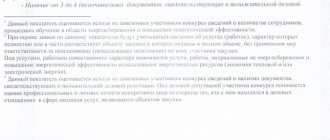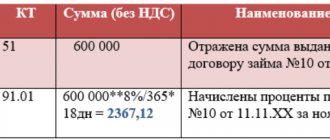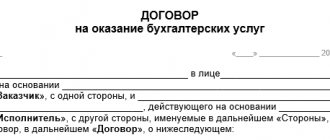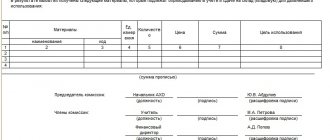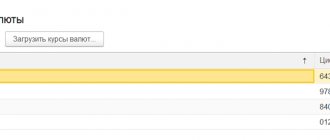4.5 average of 74 ratings
Create, save and display acts for free on our website. Individual entrepreneurs and LLCs can issue a certificate of completion of work without restrictions. The procedure for issuing a certificate is very simple: below, read the step-by-step instructions for generating and sending certificates online from our website.
Free sending of reports via the Internet is provided by Kontur.Accounting - an online service for maintaining records, calculating salaries and sending reports via the Internet. If you do not yet have an accountant, then you can always turn to trusted partners of SKB Kontur for help. Submit your application!
Submit certificates of completed work online with us
Convenient to use
Print and send documents from the service. Save time.
Reliable
Your documents will not fall into the wrong hands: after sending they are automatically deleted
Simple and clear
Even a beginner can submit an act online in the service; no knowledge of accounting is needed
Fast
We will fill in the details automatically using the Taxpayer Identification Number (TIN), and instantly evaluate the counterparties.
Economical
No need to waste paper or install additional paid programs
Available
Use the service anywhere in the world where there is Internet
The date of the order is the date of its signing
During the preparation process, this order is agreed upon, and visas of all interested parties are affixed, after which the first copy of this document with all visas is submitted to the manager for signature. After signing, orders are registered in the accepted URF, assigning a number and date. Put the date and number on the document itself.
We recommend reading: Bailiffs of the City of Kemerovo Find out the Debt
If the first copy of the document is not signed by the first manager (during his absence), then it is necessary to put on all subsequent copies the name of the official who actually signed the order.
Why do you need a certificate of completion?
Without acts, all company expenses cannot be taken into account when calculating income tax. The act of performance of work and services (or, as it is also called the “act of acceptance and transfer”) is provided for in the contract signed between the customer and the contractor as a closing document.
The act is written evidence of the completion of certain work or part thereof. The acts indicate the deadlines for completing work and services, list the work and services provided, and reflect the deadlines for completing the volumes of work that were specified in the contract.
The acceptance certificate is not a strict reporting document; the enterprise has the right to develop it independently in accordance with the Accounting Law. In this case, filling out the act is mandatory under the Tax Code of the Russian Federation. If for each missing act a fine is imposed on the violating organization, additional taxes may be assessed. Penalties will also be imposed for errors in filling out the act. If you do not yet have an accountant, then you can always turn to trusted partners of SKB Kontur for help. Submit your application!
What is considered the date of signing the service acceptance certificate
Often the Contractor and the Customer sign the Certificate of Acceptance of Services (Works) not simultaneously, but in different sequences - first the Contractor, then for how long (determined by the contract) the Customer. In the contract, this is formulated in such a way that the Contractor provides the Customer with two copies of the Certificate of Acceptance of Services Rendered, signed on its part. And the Customer is obliged, within some time after receiving the acceptance certificate for the services provided, to return to the Contractor one copy of the Certificate, signed on its part, or to provide the Contractor with a reasoned refusal to accept the services. The date of signing the Act is important because it is usually tied to the time within which payment must be made.
For example, the Customer must sign the Certificate within 3 days and make payment within 5 (after signing). Does this mean that payment must be made within 8 days from the date of transfer of the Act by the Contractor? Or within 5 days from the date of transfer of the Act by the Contractor, because Is there already a date for signing the Act?
We recommend reading: Objections to the Application for Collection of Legal Costs for the Representative
Taxes and Law
Most regulatory legal acts come into force simultaneously throughout the entire territory of the Russian Federation upon expiration of a specified number of days after the day of their official publication. It is with the counting of these days, as well as with determining the date of the first official publication of the normative act, that the most problems arise.
Table. The procedure for the entry into force of certain types
regulatory legal acts
| Type of normative legal act | Procedure for entry into force <*> | Official publication source |
| Federal constitutional laws | Come into force simultaneously throughout the entire territory of the Russian Federation after 10 days after the day of their official publication (Article 6 of Law No. 5-FZ) | “Rossiyskaya Gazeta”, “Parliamentary Gazette”, Collection of Legislation of the Russian Federation or posting on the official Internet portal of legal information www.pravo.gov.ru (Article 4 of Law No. 5-FZ) |
| Federal laws | ||
| Acts of the chambers of the Federal Assembly | ||
| Acts of legislation on taxes (with the exception of acts introducing changes to the Russian Federation regarding the establishment of new taxes) | Come into force no earlier than after one month from the date of their official publication and no earlier than the 1st day of the next tax period for the relevant tax (paragraph 1, clause 1, article 5 of the Tax Code of the Russian Federation) | |
| Acts of legislation on fees (with the exception of acts introducing changes to the Russian Federation regarding the establishment of new fees) | Come into force no earlier than one month from the date of their official publication (paragraph 2, paragraph 1, article 5 of the Tax Code of the Russian Federation) | |
| Federal laws introducing changes in the Russian Federation regarding the establishment of new taxes or fees | Come into force no earlier than January 1 of the year following the year of their adoption, but not earlier than one month from the date of their official publication (paragraph 3, paragraph 1, article 5 of the Tax Code of the Russian Federation) | |
| Federal laws on the federal budget | Come into force on January 1 and are valid until December 31 of the corresponding financial year, unless otherwise provided by the Budget Code or the budget law itself (clause 1 of Article 5 of the Budget Code) | |
| Acts of legislation on customs affairs | Come into force no earlier than 30 days after the day of their official publication, unless otherwise established by the customs legislation of the Customs Union (Clause 3, Article 6 of the Federal Law of November 27, 2010 N 311-FZ “On Customs Regulation in the Russian Federation”) | |
| Decrees and orders of the President of the Russian Federation that are normative in nature | Come into force simultaneously throughout the entire territory of the Russian Federation after 7 days after the day of their first official publication (paragraph 1, paragraph 5 of Decree No. 763) | “Rossiyskaya Gazeta”, Collection of legislation of the Russian Federation or posting on the official Internet portal of legal information www.pravo.gov.ru (clauses 2 and 2.1 of Decree No. 763) |
| Other decrees and orders of the President of the Russian Federation (including acts containing information constituting state secrets or confidential information) | Come into force from the date of their signing (paragraph 2, paragraph 5 of Decree No. 763) | Not subject to official publication (clause 1 of Decree No. 763) |
| Decrees and orders of the Government of the Russian Federation affecting the rights, freedoms and responsibilities of individuals and citizens, establishing the legal status of federal executive authorities, as well as organizations | Come into force simultaneously throughout the entire territory of the Russian Federation after 7 days after the day of their first official publication (paragraph 1, paragraph 6 of Decree No. 763) | “Rossiyskaya Gazeta” or Collection of Legislation of the Russian Federation (clause 2 of Decree No. 763) |
| Other decrees and orders of the Government of the Russian Federation (including acts containing information constituting a state secret or information of a confidential nature) | Come into force from the date of their signing (paragraph 2, paragraph 6 of Decree No. 763) | Not subject to official publication (clause 1 of Decree No. 763) |
| Orders, instructions and other regulatory legal acts of federal executive authorities (ministries of the Russian Federation, federal services, agencies and other departments), recognized by the Ministry of Justice of Russia as not requiring state registration | Come into force in the manner determined by the federal executive body itself, which approved this normative act (paragraph 5, clause 17 of the Rules for the preparation of normative legal acts of federal executive bodies and their state registration, approved by Decree of the Government of the Russian Federation of August 13, 1997 N 1009 ) | The procedure for their official publication is established by the federal executive body itself, which approved this normative act (paragraph 5, clause 17 of the Rules for the preparation of normative legal acts of federal executive bodies and their state registration) |
| Orders, instructions and other normative acts of federal executive authorities that have undergone state registration with the Ministry of Justice of Russia and affect the rights, freedoms and responsibilities of individuals and citizens, establishing the legal status of organizations or having an interdepartmental nature | Come into force simultaneously throughout the entire territory of the Russian Federation after 10 days after the day of their official publication (paragraph 1, paragraph 12 of Decree No. 763) | “Rossiyskaya Gazeta” or Bulletin of normative acts of federal executive authorities (clause 9 of Decree No. 763) |
| Orders, directives and other regulatory legal acts of federal executive authorities that have undergone state registration with the Ministry of Justice of Russia, but contain information constituting a state secret, or information of a confidential nature that is not subject to official publication in this regard | Come into force from the date of their state registration with the Ministry of Justice of Russia and assignment of a number to them (paragraph 2 of paragraph 12 of Decree No. 763) | Not subject to official publication (clause 8 of Decree No. 763) |
| ——————————— <*> The procedure given in the table is applied if the normative legal act itself does not establish the exact date from which it begins to take effect, or does not indicate another procedure for the entry into force of this act (Art. 6 of Law No. 5-FZ, paragraph 7 and Decree No. 763). | ||
In addition, the text of the regulations themselves may use different wording regarding the timing of their entry into force. For example, it may be stated that the document comes into force on or after the day of its official publication, or after a certain period or after a certain period. At first glance, there is no difference between these phrases. But that's not true. Indeed, depending on what specific wording is used, the date of entry into force of the normative act is determined differently.
Placement of certain types of regulations
on a special Internet portal is now equal to
for their official publication
All laws are subject to official publication for public information (Part 3 of Article 15 of the Constitution of the Russian Federation). Unpublished laws are not applied and have no legal consequences. Also, any other regulatory legal acts affecting the rights, freedoms and responsibilities of a person and a citizen are not subject to application if they have not been officially published.
The official publication for most regulatory legal acts is considered to be the first publication of their full text in the Rossiyskaya Gazeta or the Collection of Legislation of the Russian Federation (Article 4 of the Federal Law of June 14, 1994 N 5-FZ, hereinafter referred to as Law N 5-FZ, and clause 2 Decree of the President of the Russian Federation of May 23, 1996 N 763, hereinafter referred to as Decree N 763).
With regard to acts of the chambers of the Federal Assembly, federal and federal constitutional laws, their publication in the Parliamentary Gazette (Article 4 of Law No. 5-FZ) is also official.
Starting from November 10, 2011, another official source of publication appeared - posting the text of the normative act on the official Internet portal of legal information www.pravo.gov.ru (see box below). But this resource is considered a place of official publication only for federal and federal constitutional laws, acts of the chambers of the Federal Assembly, as well as decrees and orders of the President of the Russian Federation (Article 4 of Law No. 5-FZ, clause 2.1 of Decree of the President of the Russian Federation of 04/05/1994 N 662 and clause 2.1 of Decree No. 763).
Algorithm of actions. How to find out the date a document was posted on the official Internet portal
To find exactly when a normative act was posted on the official Internet portal of legal information www.pravo.gov.ru, you need to:
— on the main page of this site, use the menu at the top of the screen to open the “Publishing” section;
— in the submenu that opens, select the “Search” subsection;
— indicate in the search card the known details of the normative act of interest (it is enough, for example, to enter only its number) and click the “Find” button. In the card, you can also choose how to display search results, in particular, indicate the number of documents, information about which is displayed on the screen (10, 30, 100 or 200 pieces), their sorting options (by date of signing or publication, type of document, receiving authority, number, etc.) and ordering (ascending or descending).
Under the search card you will see a list of found documents with their full details, a link to the text of the document (file in PDF format), the date and number of its publication on the site.
At the same time, other regulatory legal acts may be posted on the specified Internet portal, for example, decrees and orders of the Government of the Russian Federation, orders of ministries and departments, in particular the Ministry of Finance and the Federal Tax Service of Russia (paragraph 3 of Article 9.1 of Law No. 5-FZ). But this is not considered their official publication.
Note that the emergence of a new source of official publication eliminates many of the problems associated with determining the date of entry into force of a normative act. After all, as a rule, a document is posted on the Internet portal earlier than in printed publications. Therefore, there should no longer be any difficulties in determining the date of its first official publication, even if the document is also published in Rossiyskaya Gazeta and in the Collection of Legislation of the Russian Federation, but on different days.
However, this positive change applies only to federal and federal constitutional laws, acts of the chambers of the Federal Assembly, as well as decrees and orders of the President of the Russian Federation. For other regulations, the problem of determining the date of their first official publication still remains relevant.
If the document is published in several official sources
on different days, the date of its first publication
can be defined in different ways
Often the same new normative act is published in several publications at once, usually on different days. How, in this case, can we determine the date of its first official publication?
This question is very relevant, because Rossiyskaya Gazeta is published every day except Saturday and Sunday, and the Collection of Legislation of the Russian Federation and the Parliamentary Gazette are published once a week on Mondays and Fridays, respectively. Moreover, at the Meeting of Legislation of the Russian Federation, the date of signing the issue is put into print, and it is considered the date of its publication. On the weekly "Parliamentary Gazette" the date range is indicated, for example, July 20 - 26, 2012. Having analyzed judicial practice, two options can be distinguished.
Based on when the publication actually reaches readers. The Constitutional Court of the Russian Federation indicated back in 1996 that the date of the first publication of a normative act should be determined taking into account the moment at which a particular printed publication in which it is published actually reaches its recipients, that is, readers and subscribers (clause 6 motivational part of the Resolution of the Constitutional Court of the Russian Federation dated October 24, 1996 N 17-P). After all, the purpose of official publication is precisely to promulgate a normative act to the public.
Obviously, at the time the weekly is signed for publication, this goal cannot be achieved, since the publication will go on retail sale or will be delivered by subscription much later.
Thus, if a document was first posted in the Collection of Legislation of the Russian Federation, and within a few days thereafter published in Rossiyskaya Gazeta, the date of its first official publication should be considered the date of placement in Rossiyskaya Gazeta.
Similar explanations regarding the date of entry into force of specific regulations are contained in Letters of the Federal Social Insurance Fund of the Russian Federation dated October 3, 2006 N 02-18/06-10588 and the Ministry of Health and Social Development of Russia dated July 25, 2006 N 1556-12. The Presidium of the Supreme Arbitration Court of the Russian Federation and the Constitutional Court of the Russian Federation were guided by the same principles when determining the date of the first publication of specific federal laws (Resolution of the Presidium of the Supreme Arbitration Court of the Russian Federation dated January 30, 2007 N 11263/06 and Determination of the Constitutional Court of the Russian Federation dated December 1, 1999 N 218-O).
The majority of arbitration courts reason in a similar way (Resolutions of the Federal Antimonopoly Service of the Urals dated 04.08.2011 N F09-4592/11 and dated 02.03.2011 N F09-638/11-S1, of the West Siberian Court dated 28.12.2011 N A03-6749/2011 and from 11/28/2006 N F04-7774/2006(28627-A03-9), Moscow dated 12/06/2010 N KA-A40/15328-10, North Caucasian dated 11/22/2010 N A32-7082/2010 and dated 03/23/2009 N A32-1067/2008-12/24, Volga region dated 06/03/2008 N A65-28895/07-SA3-43 and dated 03/25/2008 N A65-29468/2007-CA3-43, Far Eastern dated 12/18/2007 N F03-A37 /07-1/5517 and from 08.11.2006, 01.11.2006 N F03-A73/06-2/3955, North-Western from 16.11.2007 N A56-59517/2005 districts).
However, in such a situation, it is necessary to take into account the difference between the publication dates of the Rossiyskaya Gazeta and the Collection of Legislation of the Russian Federation or the Parliamentary Gazette. Thus, if the difference in dates is more than seven days, it is safer to consider the date of the first official publication of a normative act as the date of its publication in the Collection of Legislation of the Russian Federation or the Parliamentary Gazette, rather than in the Rossiyskaya Gazeta. After all, with such a significant difference in dates, it is not known which of these publications reached its recipients earlier.
Formally, based on the norms of Law No. 5-FZ and Decree No. 763. The courts of some federal districts approach determining the date of the first official publication of a normative act quite formally. They proceed from which of the printed publications in which the normative act was published has the earliest date.
In cases where such a source of publication turned out to be the Collection of Legislation of the Russian Federation, the courts determine the date of entry into force of the normative act, taking as the starting point the date of its publication in this publication (Resolution of the Federal Antimonopoly Service of Moscow dated 09.08.2012 N A40-111323/11-149 -715, North Caucasus dated May 25, 2005 N F08-2159/05-882A and East Siberian district dated May 12, 2005 N A74-3716/04-F02-2008/05-C2). And this is even despite the fact that in the cases considered, the difference in the dates of publication of the normative act in the Rossiyskaya Gazeta and the Collection of Legislation of the Russian Federation was only one or two days.
The Plenum of the Supreme Court of the Russian Federation and the Plenum of the Supreme Arbitration Court of the Russian Federation acted in a similar manner when deciding the issue of the commencement of a specific federal constitutional law (clause 2 of the joint Resolution dated 04.02.2010 N 3/2).
The key word in the phrase about the entry into force of a normative act
the preposition “with” or “after” is in force
According to the general rules, federal and federal constitutional laws and acts of the chambers of the Federal Assembly come into force 10 days after the day of their official publication (Article 6 of Law No. 5-FZ). Most of the decrees and orders of the Government of the Russian Federation, decrees and orders of the President of the Russian Federation come into force seven days after the day of their first official publication (clause 5 and Decree No. 763).
In all the above formulations the phrase is used: “After the day of official publication.” At the same time, the normative act itself may provide for a different procedure for its entry into force. Often in this case it is indicated that the document comes into force:
- from the date of its official publication;
- after the day of its official publication;
- upon the expiration of a certain number of days, months or other period from the day or after the day of its official publication;
- after a certain period from the day or after the day of its official publication.
It would seem that the wording is almost the same. But still, depending on which phrase is used in the document, the date of its entry into force is determined differently.
The document comes into force on the day (after the day) of its publication. Let’s say a normative act states that it comes into force on the day of its official publication. This means that it comes into effect immediately on the day of its first official publication.
If the document uses the phrase: “After the day of official publication,” then it will come into force the next day after the date of its first official publication.
Similarly, the start date of a document is determined, which comes into force after a certain period from the day or after the day of its official publication. If the phrase: “From the date of publication” is indicated, then the date from which the established period is counted is the day of its first official publication. That is, the day of publication is also included in the calculation.
Note. If the phrase “from the date of publication” is used in the order of entry into force of a normative act, then the starting point for calculating the period when it comes into effect is the day of its official publication.
For example, the text of the federal law states that it comes into force after 30 days from the date of its official publication. Let's assume that the text of the federal law is posted on the official Internet portal www.pravo.gov.ru on September 10, 2012. This means that this date is the beginning of the 30-day period after which the law will come into force. The specified period will expire on October 9, 2012. Consequently, the federal law will come into force on October 10, 2012.
If the phrase “After the day of publication” is used in a normative act, then the period after which it will come into force is calculated from the day following the day of its official publication.
So, if we change the wording in the considered example, then the beginning of the 30-day period will be considered the next day after the text of the federal law is posted on the official Internet portal, that is, September 11, 2012. The established 30-day period will expire in this case a day later — October 10, 2012. This means that the federal law will come into force on October 11, 2012.
However, some experts believe that, regardless of the pretext used in the wording, the first day for counting the relevant period is always considered to be the next day after the date of official publication of the normative act. After all, the flow of a period defined by a period of time begins the next day after the calendar date or the occurrence of the event that determines its beginning (Article 191 of the Civil Code of the Russian Federation and clause 2 of Article 6.1 of the Tax Code of the Russian Federation). This is exactly the approach that was used, for example, by the Plenum of the Supreme Arbitration Court of the Russian Federation when determining the date of entry into force of the Federal Law of October 26, 2002 N 127-FZ “On Insolvency (Bankruptcy)” (Resolution of April 8, 2003 N 4).
In addition, with regard to regulatory legal acts of the city of Moscow, it is established that the day of the official publication of the document is not taken into account when calculating the period after which it comes into force (clause 2 of article 19 of the Law of Moscow dated 07/08/2009 N 25 “On legal acts of the city of Moscow"). However, federal legislation does not provide for a similar provision. Therefore, when calculating the period after which a particular document at the federal level comes into force, it is advisable to proceed from the specifics of the Russian language and take into account the semantic load of the preposition used in the formulation.
The document comes into force upon expiration (after) a certain period after its publication. Most often, the text of regulations states that they come into force upon the expiration of a certain period from the day or after the day of official publication. But it also happens that the following formulation is used: “After a certain period,” that is, one or three months, or a year or even several years after publication.
To determine the last day of such a period, it does not matter which of these phrases is used - “After a certain period” or “After a certain period.” However, difficulties arise if the period after which the normative act comes into force is set in months or years.
Note. To determine the last day of the period after which the normative act comes into force, it does not matter which of the possible formulations is used - “After a certain period” or “After a certain period”.
The document comes into force several months or years from the day (after the day) of its publication. Often, not only organizations or tax authorities, but even arbitration courts calculate the deadlines established in months or years differently. To understand this issue, let us turn to the norms of civil and tax legislation.
The term, calculated in months, expires on the corresponding date of the last month of the term. If the end of the established period falls on a month in which there is no such date, for example, February, then the period expires on the last day of this month (clause 3 of Article 192 of the Civil Code of the Russian Federation and clause 5 of Article 6.1 of the Tax Code of the Russian Federation).
The period, calculated in years, expires in the corresponding month and day of the last year of the term (clause 1 of article 192 of the Civil Code of the Russian Federation and clause 3 of article 6.1 of the Tax Code of the Russian Federation). In this case, a year, with the exception of the calendar year, is any period of time consisting of 12 consecutive months.
Let's assume that a federal law states that it comes into force after three months from the date of its official publication. Its text was posted on the official Internet portal www.pravo.gov.ru on September 14, 2012. This means that it will come into force on the same date of the third month, that is, December 14, 2012.
Let us note that if this federal law had indicated that it would come into force three months after the day of its official publication, then it would have taken effect a day later, that is, from December 15, 2012.
However, in a similar situation, the Russian Ministry of Finance came to a different conclusion. Specialists from this department clarified some issues related to the entry into force of the Federal Law of July 19, 2009 N 205-FZ <1>. The text of the Law itself stipulates that one of its articles comes into force no earlier than one month from the date of its official publication. The text of the Federal Law was published in Rossiyskaya Gazeta on July 22, 2009. This means that, in accordance with the norms of the Civil Code, this article began to take effect on the same date of the next month, that is, from August 22, 2009. But, according to the Ministry of Finance of Russia, it came into force only the next day - from August 23, 2009 (Letter dated December 21, 2009 N 03-05-05-03/22).
———————————
<1> The said Federal Law introduced significant changes to a number of legislative acts of the Russian Federation, including the Laws on LLCs, the Russian Federation, the Code of Administrative Offenses of the Russian Federation, the Arbitration Procedure Code of the Russian Federation, etc. Since these amendments affected many companies, the question often arose about the date of their entry into force. by virtue of.
There were also disagreements regarding the determination of the date from which the Federal Law of July 19, 2009 N 205-FZ itself came into force. Read more about this in the box below.
Case from practice. The vicissitudes with the date of entry into force of one Federal law
The text of the Federal Law dated July 19, 2009 N 205-FZ “On Amendments to Certain Legislative Acts of the Russian Federation” states that it comes into force 90 days after the day of its official publication, with the exception of certain norms that come into force in a special ok. Since in this case the preposition “after” is used, the starting point is not the date of publication of the Law, but the day following it—July 23, 2009.
The established 90-day period expired on October 20, 2009. Consequently, the Law came into force the next day after the end of this period - from October 21, 2009. The majority of courts came to the same conclusion (Resolution of the Federal Antimonopoly Service of the Far East dated October 14, 2011 N F03-4084 /2011, East Siberian dated 08/05/2010 N A33-917/2010, Moscow dated 06/03/2010 N KG-A40/5551-10, North Caucasian dated 04/08/2010 N A18-1163/2009 and Ural dated 03/10/2010 N Ф09-733/10-С4 districts). In contrast, the FAS of the Central District indicated that this Federal Law came into force on October 23, 2009 (Resolution dated April 21, 2010 N A14-15452/2009/410/4). It seems that the court came to exactly this conclusion, since it erroneously considered that the Law came into force not after 90 days, but after three months after the day of its official publication.
True, later, when considering other cases, the FAS of the Central District admitted, like the courts of other federal districts, that this Law began to operate on October 21, 2009 (Resolutions of the FAS of the Central District dated November 18, 2011 N A68-470/2011 and from 02/08/2011 N A64-753/2010).
Vaitman E.V. How not to make a mistake when determining the date of entry into force of a normative act // Russian Tax Courier. 2012. N 19. P. 80 - 88.
